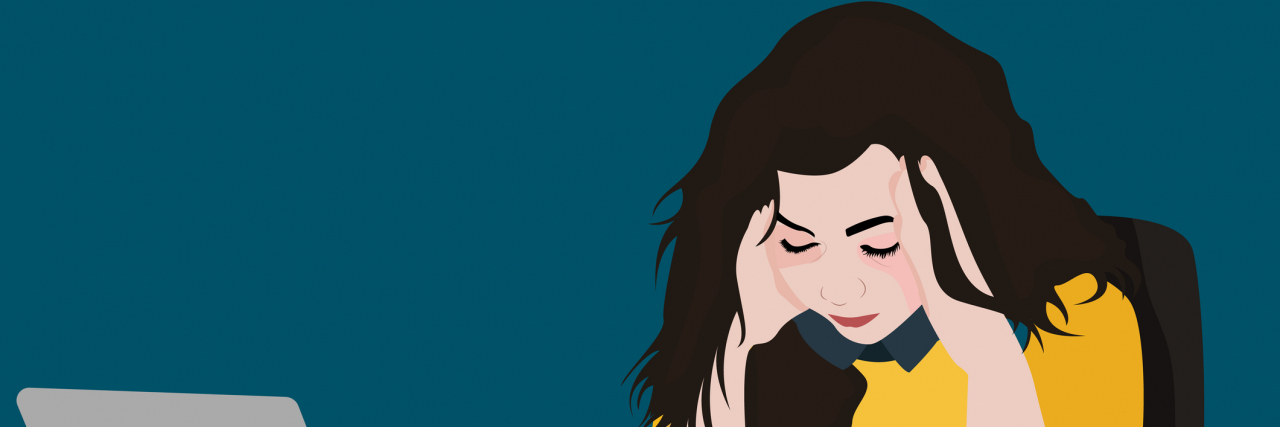How I’m Learning to Manage My Schizoaffective Disorder With Burnout
Burnout is something that is not talked about often, but it is important to understand your own limits regarding burnout. Burnout can be detrimental to your mental and physical health, and in our overactive lives, it can be hard to know when it is time to treat ourselves with extra compassion and self-care. I have found I am frequently sensitive to experience burnout quicker than others because of my mental and physical illnesses, but it wasn’t until I was diagnosed with schizoaffective disorder I began to understand the length of my limits.
I have schizoaffective disorder (depressive type), and I frequently experience hallucinations (such as hearing voices, seeing dark figures watching me, and running in front of me, as well as seeing and feeling bugs crawling all over me) on top of periods of major depression (where I cannot get out of bed, eat, or get dressed). These symptoms and this illness make it incredibly hard for me to function. I spend the majority of my time trying to manage my hallucinations and my depression, which includes trying to accomplish my activities of daily living, such as dressing myself, making sure that I eat, and other tasks such as running errands or helping others. Through therapy, I have learned I am using the majority of my brain power to manage this illness, and while some days or easier than others, this has become a full-time job. This means I have to manage my full-time job of taking care of my health on top of my work as a mental health specialist.
Having to manage my schizoaffective disorder and various other mental and physical illnesses on top of my work means I have to be vigilant with my self-care and vulnerable with what I am feeling. Before being diagnosed, I reached a point of severe burnout that led to being admitted to a behavioral health hospital. Since then, I have been seeing a psychiatrist and therapist regularly to manage my conditions.
I am still learning my limits on what I can and can’t do or accomplish on top of managing my illness, but I have found I do have a breaking point. I experience burnout when my hallucinations become so strong they interfere with my ability to identify what is real and what is not. Having to use my coping skills to maintain my sense of reality around the clock becomes exhausting, and some days, I find when my hallucinations and depression are so strong, I don’t have the energy to use my coping skills, and I begin to experience suicidal ideation.
The hallucinations paired with periods of major depression where I can barely function, including instances of suicidal ideation, tend to make my burnout level relatively low. Because I am so sensitive to burnout, I have to practice a lot of self-care and maintain a safety plan. Exhaustion, suicidal ideation, and forgetting or refusing to take my medications are the main signs I look for when I begin to experience burnout. As soon as I notice these signs, I let my treatment team know so I have extra support, and sometimes I do require a higher form of care — such as going to the emergency room if my safety is in jeopardy.
Every person with schizoaffective disorder has their own limits regarding burnout, and oftentimes we differ in how we consider our burnout to be dangerous. For me, burnout becomes concerning if I can no longer maintain my self-care schedule including activities of daily living, my hallucinations become out of control in that I can no longer differentiate them from reality, and I experience severe thoughts of suicidal ideation. Having a treatment team helps me to avoid burnout and receive help when I feel myself falling in that direction, but sometimes I do need to get help from my local emergency room if I feel like my symptoms are out of control.
Burnout is a serious thing and can be detrimental to our mental and physical health. It is important we understand our own limits and practice self-care to ensure we remain healthy. Pushing ourselves to the point of burnout can become toxic and extremely dangerous, and we need to remind ourselves in an overactive world we are important, our health is important, and we have the right to care for ourselves and say “no” when we feel ourselves on the brink of burnout.
Getty image by eclipse_images

